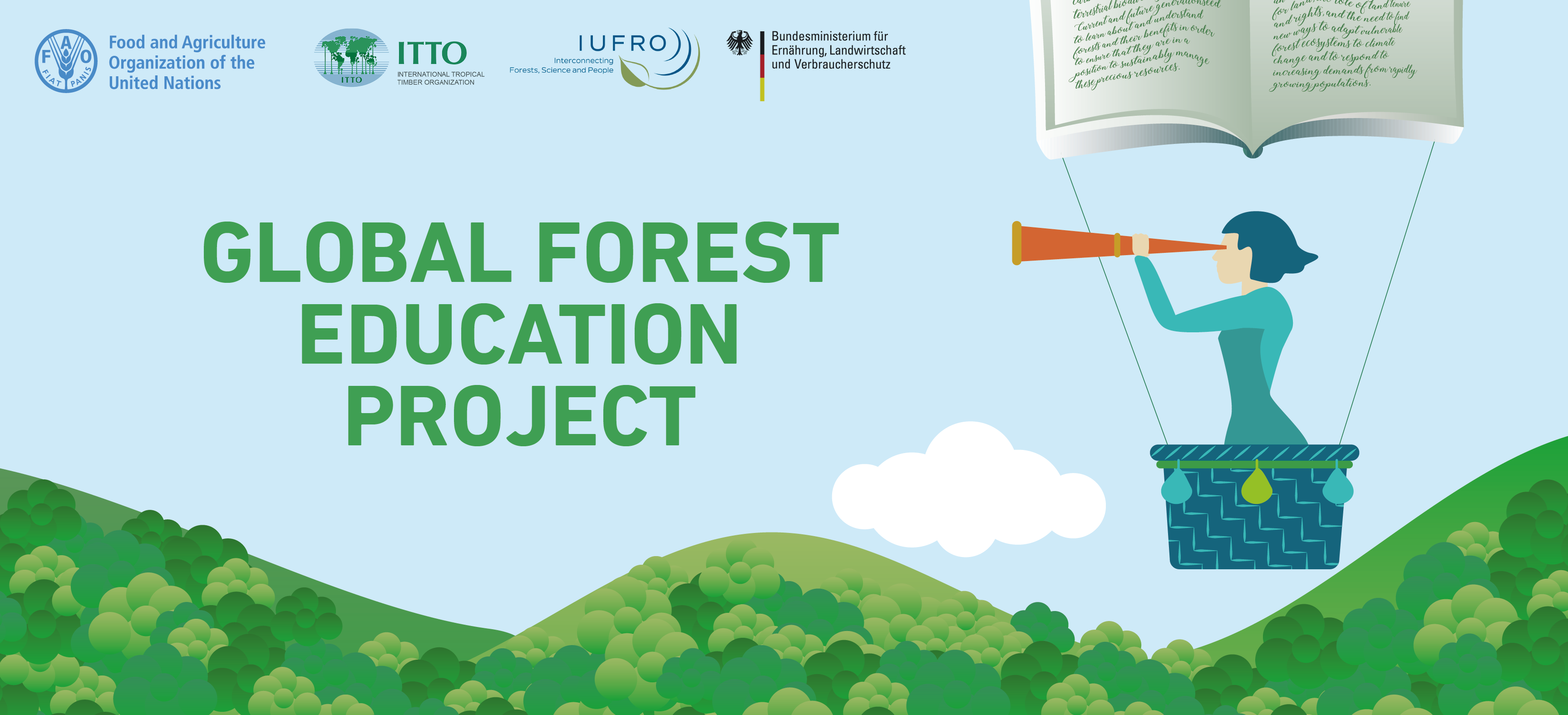
Global Forest Education Project
The Food and Agriculture Organization, the International Tropical Timber Organization and the International Union of Forest Research Organizations were lead partners in the project “Creation of a Global Forest Education Platform and Launch of a Joint Initiative under the Aegis of the Collaborative Partnership on Forests”. The project was financed by the Germany Federal Ministry of Food and Agriculture (BMEL). It was operational from November 2019 through June 2021.
The goal of the project was to catalyze, accelerate and enhance broad efforts in forest education at national and local levels in developing countries and to counteract the considerable deficiencies in forest education in many parts of the world.
The project was designed to prepare the foundation for a longer-term effort in forest education, envisaged as a Joint Initiative of the Collaborative Partnership on Forests.
Project activities
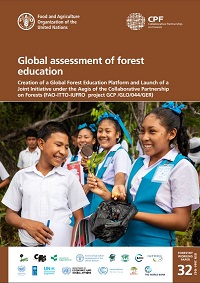 Global assessment
Global assessment
The project undertook an assessment of the status of forest education globally.
For the first time ever, a survey was carried out to inventory ongoing activities, key actors, objectives and achievements at all levels of formal education.
Published in 2022, the Global assessment report synthesized the findings of the regional assessment reports.
Regional assessments
Six regional assessments based on the survey results and information from a literature search and from forest education experts were completed.
The regional reports reflect the current status and needs of formal forest education at all levels across the six regions of the United Nations: Africa, Near East and North Africa, Asia Pacific, Europe, Latin America and the Caribbean, and North America.
They represent the findings of the Global Forest Education Survey on Forest Education (undertaken between 15 July-31 October 2020); literature reviews and research undertaken by regional partners; and findings of the project’s regional consultations hosted in early 2021. They reflect the perspectives and experiences of thousands of forest education stakeholders from around the world who generously participated in the survey, and hundreds of key experts who participated in the regional consultations.
You can find the regional reports, along with more information on regional and project partners below.
Africa
The Regional Assessment Report of Forest Education in Africa was written by Dr James K’ungu, Bethsheba Muchiri, and Anne Kuria and published in English and French. Regional partner, ANAFE (African Network for Agriculture, Agroforestry & Natural Resources Education), led the project’s work in Africa.
Find more information on regional partner ANAFE.
Asia Pacific
The Regional Assessment Report of Forest Education in Asia Pacific was written by Mike Shanahan, Sirichai Saengcharnchai, Julian Atkinson and David Ganz (RECOFTC). Under the guidance of project partner, ITTO, regional partner RECOFTC lead the project’s work in Asia Pacific.
Find more information on regional partner RECOFTC.
Find more information on project partner ITTO.
Europe
The Regional Assessment Report of Forest Education in Europe was written by Mika Rekola, Anne Nevgi, and Niclas Sandström (University of Helsinki). Under the guidance of project partner, IUFRO, regional partner University of Helsinki led the project’s work in Europe.
Find more information on project partner, IUFRO.
Find more information on regional partner, University of Helsinki.
Latin America and the Caribbean
The Regional Assessment Report of Forest Education in Latin America and the Caribbean was written by Dr. Sandra Rodríguez Piñeros and published in English and Spanish. Under the guidance of project partner, IUFRO, regional partner Universidad Autonoma de Chihuahua led the project’s work in Latin America and the Caribbean. Reforestamos Mexico also provided technical support to the regional consultation.
Find more information on project partner IUFRO.
Find more information on Universidad Autonoma de Chihuahua.
Find more information on Reforestamos Mexico.
Near East and North Africa
The Regional Assessment Report of Forest Education in Near East and North Africa was written by Osman Hamid and Abdelazim Ibrahim (AOAD). Regional partner, AOAD (Arab Organization for Agricultural Development), led the project’s work in Near East and North Africa.
Find more information on project partner AOAD.
North America
The Regional Assessment Report of Forest Education in North America (Canada and the United States) was written by UBC Faculty of Forestry, Terry Sharik and Rocco Saracina. Regional partner, UBC (University of British Colombia – Faculty of Forestry) led the project’s work in North America. Michigan Technological University and Project Learning Tree Canada provided additional technical support to the regional assessment report and to the regional consultation.
Find more information on regional partner UBC.
Find more information on Michigan Technological University.
Find more information on Project Learning Tree Canada.
Six virtual regional consultations on the topic of forest education took place in February 2021.
The consultations were a critical component of an initiative to strengthen forest education globally, led by FAO, the International Tropical Timber Organization (ITTO) and the International Union of Forest Research Organizations (IUFRO) and is generously funded by the Government of Germany.
The objective of each regional consultation was twofold: 1) to validate the findings of the regional assessment report on forest education, informed by a global survey; and 2) to identify actions that could be taken to strengthen forest-related education in the region.
Summary reports
- Anglophone Africa
Francophone Africa (French language) - Asia Pacific
- North America
- Europe
- Latin America and the Caribbean (Spanish language)
- Near East and North Africa
Digital welcome package
Digital welcome package video transcript: English, Spanish, French, Arabic
 | Dr Andrew Taber, Team Leader, Social Forestry Team and Lead Technical Officer for the Global Forest Education Project at FAO, provides opening remarks in support of the regional consultations. | |
 | Dr Eva Mueller, Director General for Forests, Sustainability and Renewable Resources of Germany’s Federal Ministry of Food and Agriculture (BMEL) provides opening remarks in support of the regional consultations. | |
 | Dr Mika Rekola, Helsinki University and Chair of the Technical Advisory Committee (TAC) for the Global Forest Education Project, provides opening remarks in support of the regional consultations. |
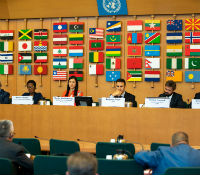
The International Conference on Forest Education (ICFE), organised by FAO, IUFRO, ITTO, CIFOR/ICRAF and the Secretariats of UNFF and UNFCCC, was a defining event in forest education.
It was instrumental in helping to chart a path forward for forest education globally. The conference celebrated the culmination of over a year-long effort involving global and regional partners to collect and synthesise information on the status and needs of forest education and training globally, and to raise awareness of the contributions that robust forest education and knowledge systems play in the achievement of multiple forest goals and forests’ contributions to the Sustainable Development Goals.
Key findings of a global assessment and six regional assessments were presented at the ICFE. Some exciting new initiatives, including by members of the Collaborative Partnership on Forests (CPF), were presented.
The participants shared their experience and perspectives through discussions of key challenges, needs, opportunities and initiatives to strengthen forest education. These will help to build the foundations for communities of interest on issues related to forest education and knowledge systems which can share information and collaborate in activities well beyond the ICFE. Participants shaped the drafting of a global Call to Action on forest education.
Webcasts
22 June: Opening plenary
23 June: Second plenary and roundtable dialogue: The evolution of forest education in a global landscape
24 June: Closing plenary
1.1 Planting the seeds: the importance of early forest education at the primary and secondary levels to inspire young minds
Briefing note
22 June: Breakout session 1 23 June: Breakout session 2
1.2 Improving the quality of forest education at tertiary level
Briefing note
22 June: Breakout session 1 23 June: Breakout session 2
1.3 Enhancing practical field training: technical and vocational education and training, and farmer field schools
Briefing note
22 June: Breakout session 1 23 June: Breakout session 2
1.4 Improving the content of traditional and indigenous knowledge in forest education and strengthening traditional knowledge systems
Briefing note
22 June: Breakout session 1 23 June: Breakout session 2
1.5 Expanding the scope of forest education: fostering a more integrated and holistic approach
Briefing note
22 June: Breakout session 1 23 June: Breakout session 2
1.6 Addressing gender and ethnicity in forest education
Briefing note
22 June: Breakout session 1 (not recorded) 23 June: Breakout session 2
1.7 The juncture of forest education and employment
Briefing note
22 June: Breakout session 1 23 June: Breakout session 2
1.8 10 reasons why you should take a job in forestry. Changing the public’s perception of the forester through strategic communication
Briefing note
22 June: Breakout session 1 23 June: Breakout session 2
2.2 Educators: school administrators and professors in vocational and tertiary level forestry programmes
Briefing note
22 June: Breakout session 1 23 June: Breakout session 2
2.3 Students in university level forestry and related programmes
Briefing note
22 June: Breakout session 1 23 June: Breakout session 2
2.4 Community groups, producer organizations and civil society organizations
Briefing note
22 June: Breakout session 1 23 June: Breakout session 2
2.5 Increasing role of the private sector in enhancing forest education
Briefing note
22 June: Breakout session 1 23 June: Breakout session 2
3.1 Tapping into digital opportunities to improve forest learning
Briefing note
22 June: Breakout session 1 23 June: Breakout session 2
3.2 Forestra: Information access and sharing through networking and online platforms
Briefing note
22 June: Breakout session 1 23 June: Breakout session 2
3.3 Contributions of forest education to the UNESCO-led Education for Sustainable Development for 2030 Agenda
Briefing note
22 June: Breakout session 1 23 June: Breakout session 2
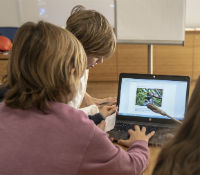
Recognizing the opportunities presented by developments in digital technologies, the project undertook two initiatives to improve online resources on forest education.
Online Platform for Forest Education
Under the leadership of IUFRO, the project prepared a prototype of the Online Platform for Forest Education (OPFE). The OPFE will be an enhanced online platform for knowledge sharing and communication among members of the Collaborative Partnership on Forests, their external partners, forest education institutions and other stakeholders. Informed by the results of the global surveys, the OPFE is being designed to provide enhanced search functionality while integrating information on a multitude of forest education resources.
Online Learning Course on Legal and Sustainable Supply Chains of Tropical Wood and Tropical Forest Products
ITTO is developing this online learning course under the project as a pilot effort to explore new approaches and technologies for forest training and education. The course will assist governments to build the enabling institutional and policy frameworks for promoting legal and sustainable supply chains and conducive business conditions for actors who operate in such a chain. The online course will cover several topics that revolve around sustainable forest management, but focus on assessing legality and ensuring accountability in the supply chain. The topics will range from legality to sustainability and to market access.
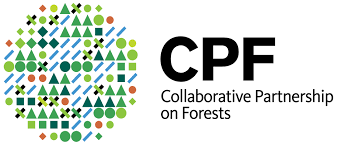 The Collaborative Partnership on Forests recognizes that forest education is key to building the knowledge, skills and shared values that underpin sustainable forest management.
The Collaborative Partnership on Forests recognizes that forest education is key to building the knowledge, skills and shared values that underpin sustainable forest management.
There is growing evidence, however, that forest education in many places around the world is not sufficiently preparing forest practitioners, professionals and workers more generally to address the challenges and respond to the opportunities facing this sector. This is putting at risk the ability of forests and trees to contribute to the Sustainable Development Goals and other forest-related goals and targets. The Joint Initiative on Forest Education was developed to redress these weaknesses.
The Joint Initiative was launched at the International Conference on Forest Education which was held virtually from 22-24 June 2021. This initiative will run at least through 2024. It is led by FAO, ITTO, IUFRO and CIFOR-ICRAF and is supported by the Secretariats of UNFF and UNFCCC. The Initiative will work to rejuvenate forest education globally through undertaking key actions related to education, training and knowledge-sharing, including improving the use of traditional forest-related knowledge.
For more information on the Joint Initiative, please refer to the related page on the Collaborative Partnership on Forests website.

Videos
Forests for a sustainable future: educating children — testing lessons in the Philippines
01/03/2024
Children in primary school today will play a significant role in bringing about the changes needed to ensure a sustainable future for forests.
Forests for a sustainable future: Educating children in Tanzania
01/07/2023
FAO is teaching children in Tanzania about the importance of managing forests sustainably. A three-year-project funded by Germany has developed forest...
Forests for a sustainable future: educating children — testing lessons in Tanzania
01/05/2023
Children in primary school today will play a significant role in bringing about the changes needed to ensure a sustainable future for forests. “Forests...
Forests and education
25/02/2021
Learning to understand our forests and providing children with a foundation to better understand their importance is a critical step to safeguarding...
New initiative to scale up forest education worldwide
31/12/2019
Failing to make bigger investments in forest education will have economic, social and environmental consequences, particularly with regard to nature...
Investing in forest education for a sustainable future
21/09/2018
Providing students with a foundation to better understand the vital role of forests is a critical step to safeguarding natural resources for future...
